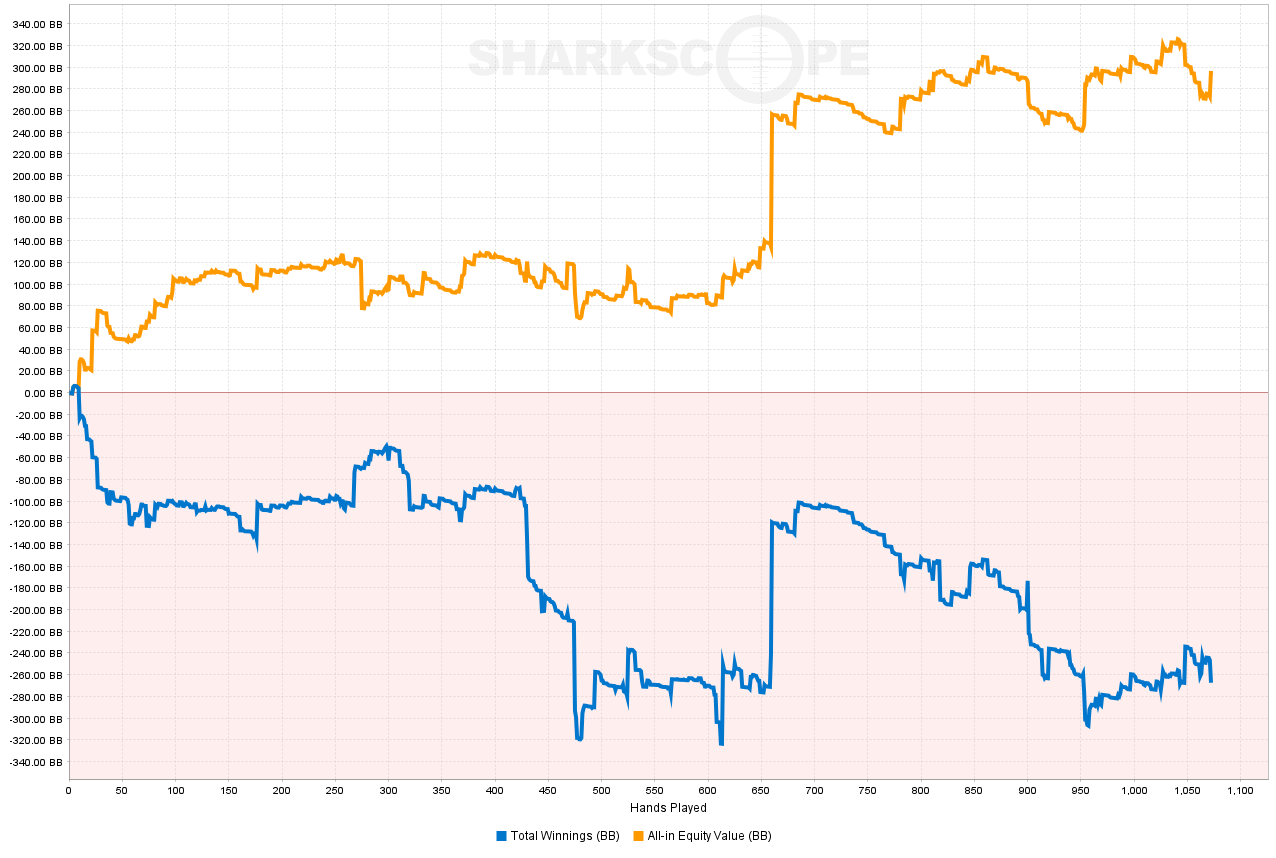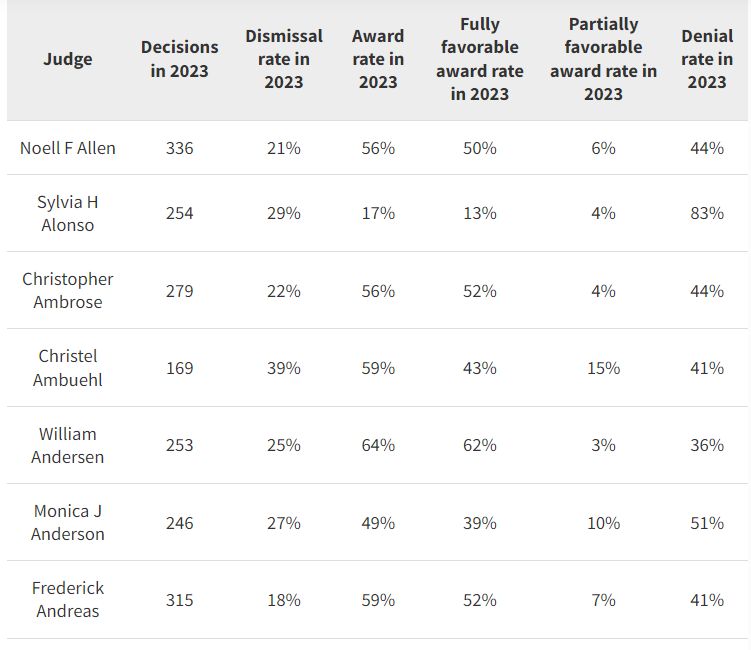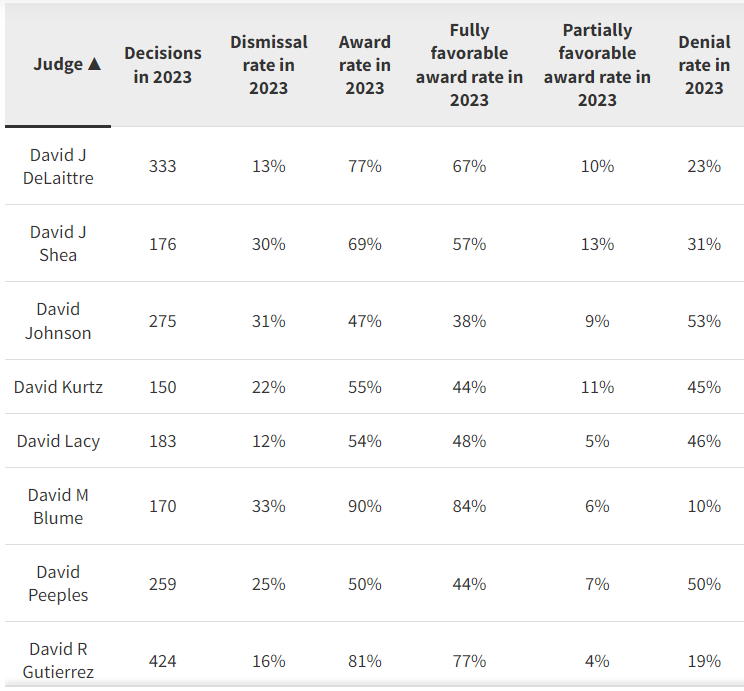Expected Value vs. Actual Value

I have returned to playing poker online after about a fifteen year layoff. I have also been reading a book called The Biggest Bluff: How I Learned to Pay Attention, Master Myself, and Win by Maria Konnikova. The book's subject matter is something I have already been very much conscious of – that poker is very much like life.
Konnikova graduated from Harvard with a B.A. in psychology and earned a Ph.D. in psychology and creative writing from Columbia University. Three years after graduating from Columbia, Konnikova thought that it would be an interesting subject matter and case study to find a professional poker player who would be willing to teach her the game and the psychology behind what makes a successful poker player. Her goal was to be able to play in the World Series of Poker the following year.

I am about two-thirds of the way through the book. While the author's goal is to be good enough to play in the largest and most prestigious tournament of the year for poker aficionados, the real point of her book is to point out the parallels between poker and life – the decision making process, the ability to read people, calculating risk/reward, the coping with downswings, minimizing risk, the success of various types of playing styles (passive vs. aggressive), accepting things you can't control (like the cards that are dealt on the felt), and minimizing the "luck" factor, but accepting that there is some element of luck in everything.
It is that last thing that I want to write about. Most serious --and, definitely, most successful — poker players use some form of "tracking" software when they play online. This software keeps track of every hand that you and your opponents play and stores it in a database.
The end result is that you can see detailed statistics on almost every aspect of how you and your opponents play. You can tell how selective you are with the amount of hands you play. How often do you raise, bet, or fold? Do you play aggressive or passive in certain spots? Most importantly, the software tells you how often – and how much – do you win.

Some poker sites frown on these apps. Some sites, downright, don't allow players to use them while they are playing on their sites. They claim it gives players unfair advantages. The players that use them have all this extra information at their disposal without having to pay too close attention to the game, itself. And knowledge is power.
My counter to that is that the software is out there for anyone to use. Yes, you do have to purchase it, but the price isn't exorbitant, and it is a small investment if you want to take the game seriously and become a winner.
Many successful online poker players multi-table. That means they play more than one table at a time. That allows pros to maximize their earnings. If you average 10% ROI (return on investment) – and, yes, the tracking software will tell you your average ROI – the more tables you play, the more you make.
Most good players will play 2-4 tables at once, but most players who play for a living play between 8-12 spread out over two or three computer monitors. Shaun Deeb, an online poker legend, once claimed to have played 40 tables, simultaneously.
When you play more than two or three tables, obviously, you can't notice the tendency of the players at all, or any, of the tables. That's where the software comes in. It does the work for you.
Essentially, the players that have this information know which players to exploit and which players to avoid without observing the games themselves. You can see where most casual players deem this kind of advantage illegal. That is why some sites ban it.
However, this type of software is also beneficial for serious players to analyze their own play after their sessions. They can review hands they played with the help of a simulator. They can review charts that show how often they win in specific situations.
If you have stuck with me this far, thank you. I am about to tie everything together to get to the point of this article.
In poker, there is a term called expected value. Poker players refer to it as EV, for short. If a situation is ripe for a bet, it is called positive EV. If a bet is ill-advised in a situation, it is called negative EV. Poker players refer to these decisions as either +EV or -EV.
The goal is to make as many +EV decisions as possible. The more positive expected value decisions you make, the more likely you are to make money.
Of course, there is an element of luck involved in any form of poker. Therefore, your actual results won't mirror, exactly, your expected results.
Poker players may go on "bad runs" where they play "perfect" poker but lose money. These bad runs can last a day, a week, a month, or even longer. It is one of the harder things for professional poker players to deal with.
The seasoned professional poker player doesn't let bad runs, or bad luck, beat them down, mentally, because they have faith and "know" that making +EV decisions, consistently, will result in them being a profitable player in the long run.
Why do they trust in this? It is the law of averages. A coin has two sides, or two possibilities. You would "expect" it to come up on one side or the other one out of every two times, or half of the time.
You may flip the coin five times, however, and it might come up heads all five times. Maybe you flip the coin ten times and it comes up heads nine times, or 90% of the time.
Well, that's not suppose to happen, you think to yourself.

But those are only small sample sizes and standard deviations (results outside of the norm) can be wider in those instances. Now, if you flip the coin a thousand times, odds are that the results will be closer to that 50/50 expected result. In the long run, things average out.
It is why professional online poker players play 8-12 tables at once. They are trying to minimize that standard deviation by getting in as big of a sample size in as short a period of time as they can.
While milling around my newly purchased tracking software, I came across a tab labeled "expected value chart." It was exactly what I was looking for.
There aren't many options available for poker sites for players from the United States to play on – it's a long story. The few sites that are available are all based outside of the United States and they are. mostly, unregulated and unlicensed. That means a player from the United States has no recourse if they feel cheated by the sites, or the sites just close down and decide to keep their money.
For that very reason, I don't keep much more than a hundred bucks on any of them. I started playing on my first site about six months ago. I added a second site about three months later because there weren't enough players playing on the first site. Then, last month, I began playing on a third site because I had read on a poker forum that this site had the highest amount of "traffic" (players) available to U.S. players.
I was a slightly profitable player while playing on the first two sites. But this third site that I started playing on a month ago has been really bugging me. Forget about winning or getting deep into any tournaments where the serious cash prizes were, I almost, literally, could not win a single hand. It didn't matter if I had the best hand or the worst hand going to the last card to be dealt on the community board on the table. I could be a 96% favorite (+EV) to win the hand with one card to go, and my opponent seemed to 100% of the time get the one of two cards (called "outs") left in the deck to win.
When that happens, it is called a "bad beat," and I was suffering bad beat after bad beat. On the rare occasions where I was wrong and I put my chips in with the worse hand (-EV), I couldn't get "lucky" even if there were 20 cards out of the 45 left in the deck that could win a hand for me. To summarize, my opponents could consistently catch one of two cards in the deck to beat me, but I couldn't catch one of twenty, ever. For an entire month!
Which brings me to the chart at the top of this article. I discovered this chart under the tab I mentioned labeled "expected value chart." It validated everything I believed. The orange line represented my "expected value" – how much I should expect to win based on the percentages when I shoved my chips all-in. The blue line represented my "actual value" – what the actual end result of the hand was.
As you can see, over 1000 hands (not a small sample size), my expected value kept rising, while my actual value kept declining. So despite my making the right decisions all the time, I was losing money.
This chart is what got me thinking. Here I, finally, had the evidence. It was something tangible for me to use to show, precisely, how unlucky I am. Call it confirmation bias, but this chart shows that even though I am making the right decision almost all the time, in reality, I am losing.
But there are more comparisons to life that can be gleamed from poker, in general, and this chart, specifically.
One of them is the concept of sample sizes. In life, we can use a day, a week, a month, or a year of our lives and consider the decisions we make on a daily basis like the decisions we make at a poker table.
I have always been of the belief that regardless of whatever religious belief you have, if you do good things and are good to people in life, you will be rewarded in the end. It's that simple. You don't have to go to church and put $10 in the basket they pass around every week. You don't even have to pray.
I'm sorry, but it would have to be one messed up Entity that doesn't allow you into Heaven – or whatever Happy Place you want to believe in after this life – just because you didn't believe in Them, or go to their church, or worship them. I refuse to believe that whatever all-powerful, all-loving Entity exists would look at my "life chart" – like my poker chart – and see all the good deeds I've done and all the good decisions (+EV) I've made and say, "Sorry, you can't come in. You didn't worship me in life. You are banished to that other place." Only Trump would do that!
That kind of a "bad beat" might happen in poker. In my case, that contradictory result, or bad beat, might also happen with the judicial system as I still await word, after three years, if I will win my case for benefits that I was denied by a Social Security judge – despite all my professional therapists saying that there is no way I could hold down a fulltime job.
If you stack all the evidence in my case and put it in chart form, it would look like my poker chart shown up above. All the evidence points to the fact that I should win my case. But there is that variable of luck involved.
Come to find out that different Social Security judges have widely varying approval rates when judging claims. Some judges approve 84% of claims while others approve as little as 13%.


My judge had a 43% approval rate.
To add insult to injury, the woman who wound up hearing my case wasn't even the original one assigned to it. I received a call from my lawyer four days before my hearing to tell me that my original judge had been replaced, at the last second, because of a health issue.
That judge, it turns out, had a 60% claim approval rate. Talk about getting dealt a life "bad beat."
However, just like in poker, you have to have faith that things will even out and, if you continue to make the right decisions, you will turn out a winner in the end. It is not easy when you are "in it," and suffering bad beat after bad beat in life. It is "tilting" (a poker term for when you are losing and you begin make emotional, irrational decisions).
So I will continue to try and keep my head up. I will have faith in the law of averages. I will remind myself that this is just a small sample size, a "bad run."
I will have faith that everything will even out, eventually – as hard as that may be to believe now – if I continue to make the right life decisions and to be good to my fellow humans (and animals, and any of God's other creatures). In fact, I should "expect" to "actually" come out a winner in the end.
(I will, however, quit playing on that most recent poker site. I think that is a +EV decision for me.)

